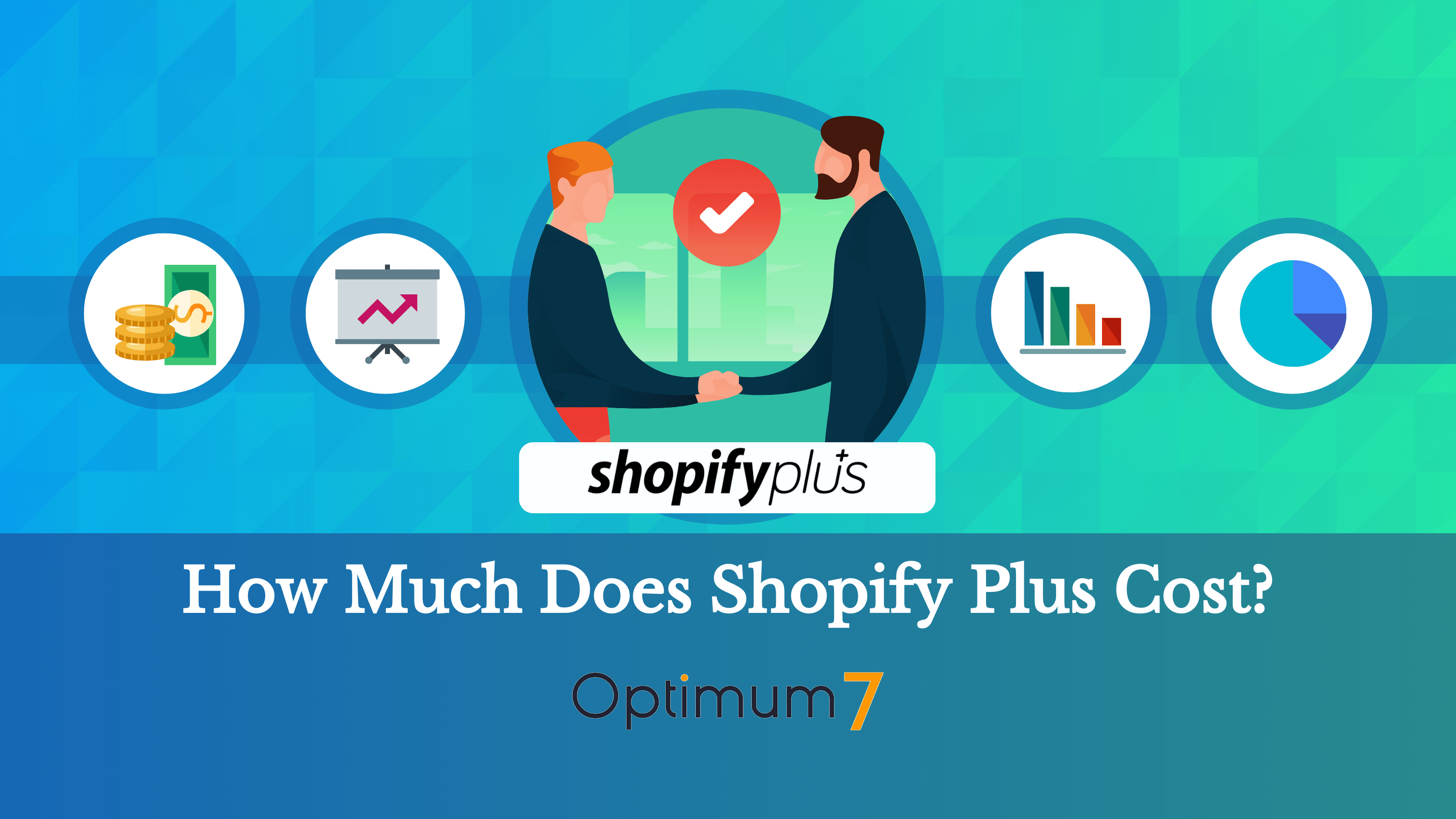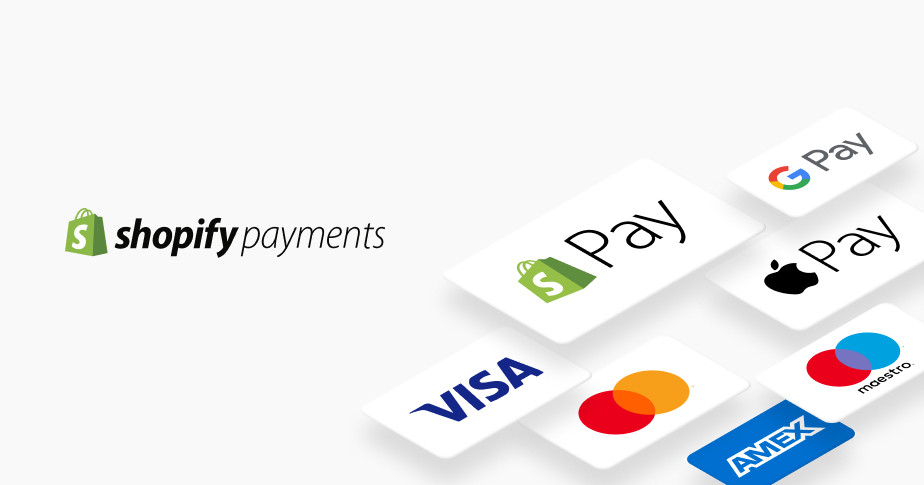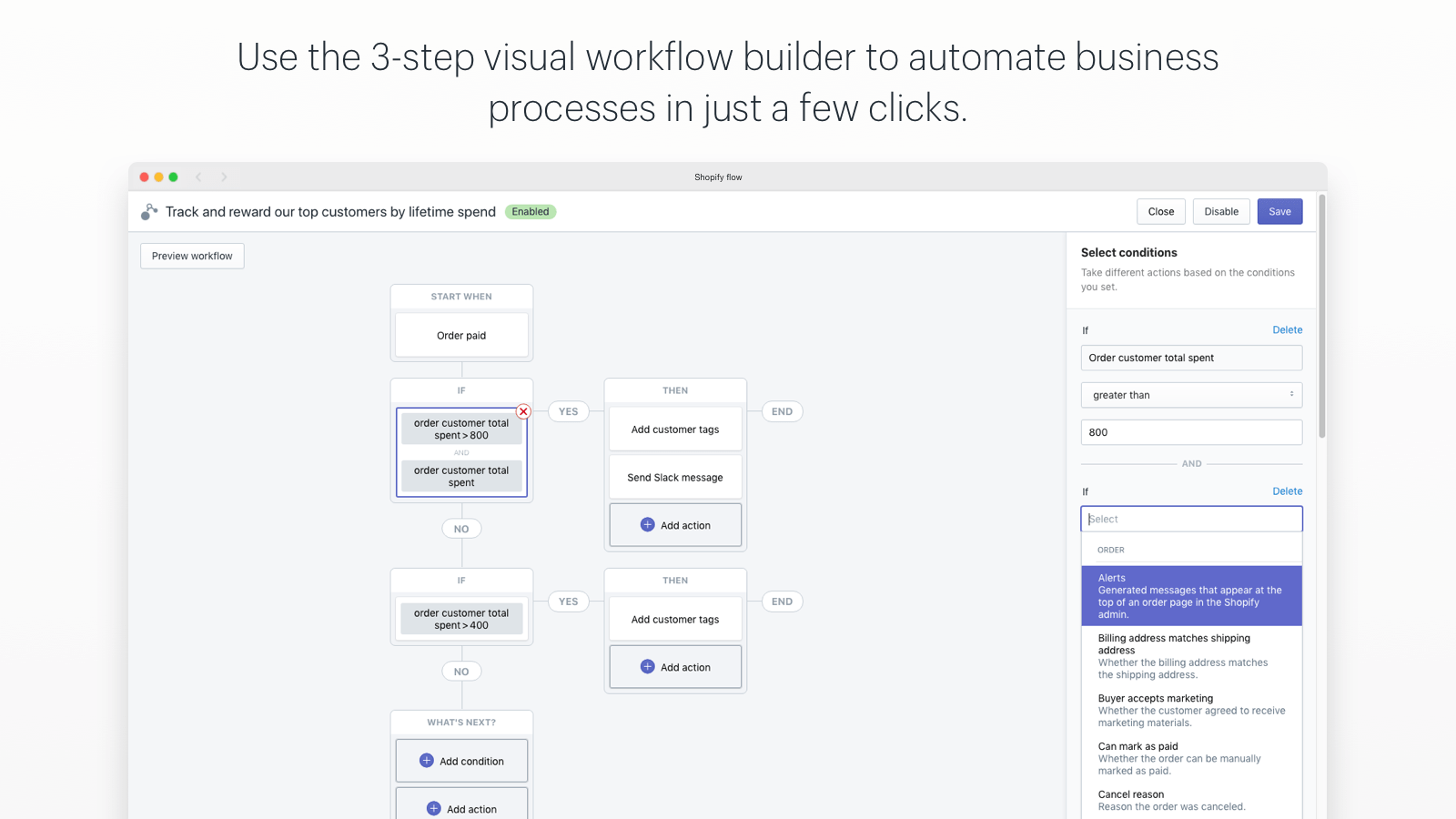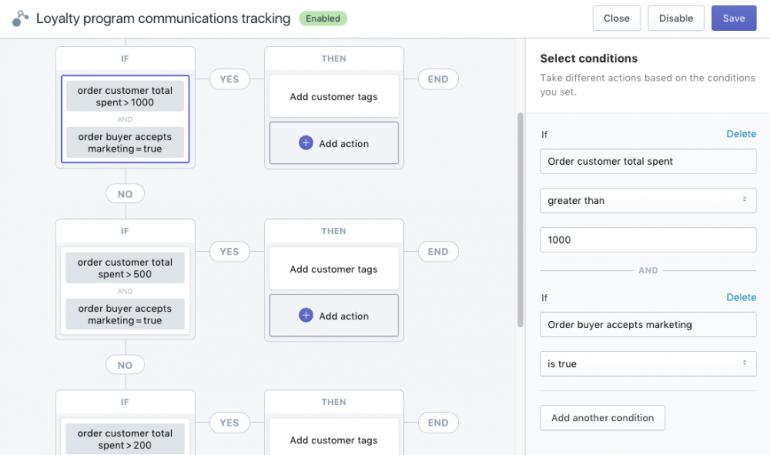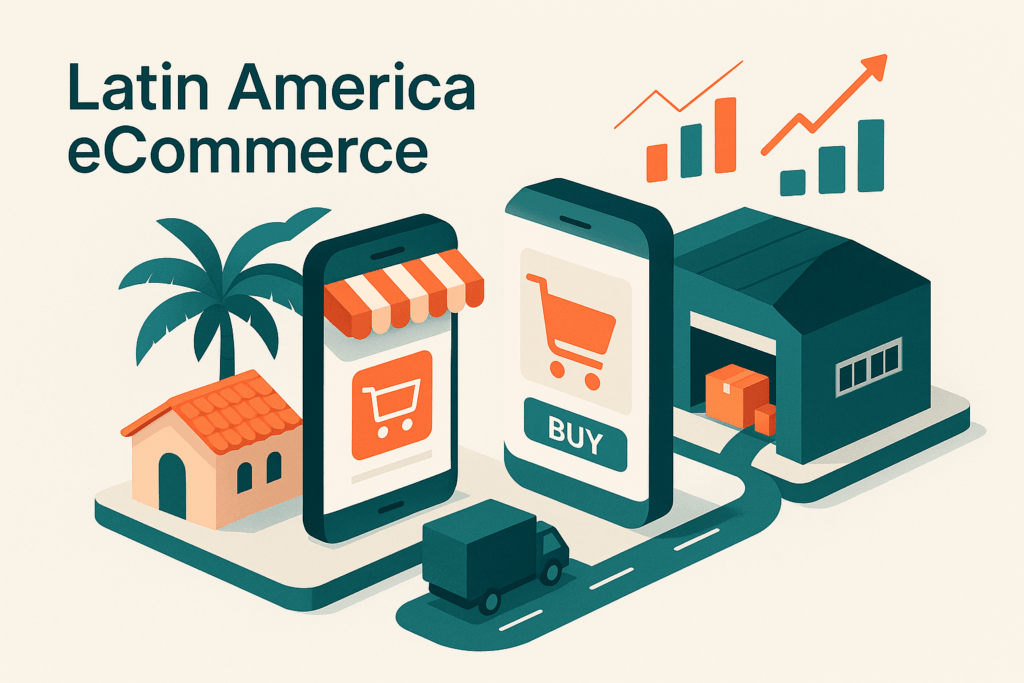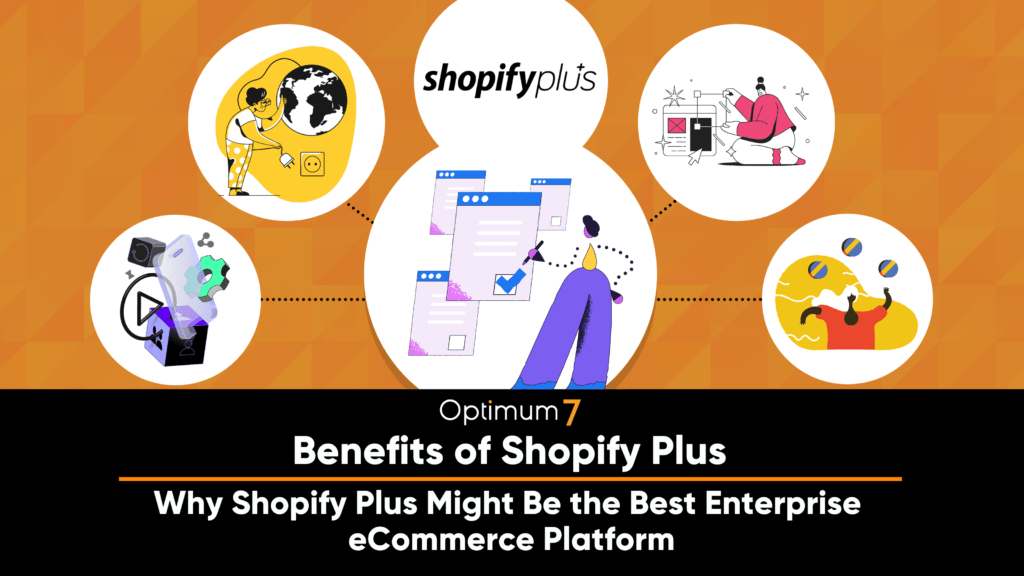The cost is one of the most significant factors to consider when deciding whether or not to upgrade your eCommerce platform. This is a frequently asked question, and there is a lot of speculation about Shopify Plus pricing. For businesses considering Shopify Plus, partnering with a knowledgeable Shopify Plus development company can help them understand the true value and potential ROI of the platform.
In this article, we’ll break down the expenses of Shopify’s business solution, Shopify Plus, so you know what to expect. And in the and we’ll have the answer to “Is Shopify Plus worth it?”
What is Shopify Plus?
Shopify Plus was created in 2014 to compete with big eCommerce merchants such as Magento, Volusion, and Demandware by Shopify.
Shopify Plus is a fully hosted business eCommerce platform for high-growth businesses and brands. Shopify has added a comprehensive set of features to its Plus offering, taking market share from the enterprise incumbents.
The Different Shopify Subscription Options
For all of their stores, Shopify offers four subscription options: Basic, Shopify Plus, and Advanced.
Shopify has a plan for you no matter how big or small your company becomes. The various pricing plans empower your firm to access more features and reduce transaction fees by providing you with additional tools to advance your business as it grows.
Who Uses Shopify Plus?
Shopify Plus is trusted by a wide range of companies globally. It caters to businesses of all sizes, from emerging startups to well-established global brands. Household names in food and beverage, health and beauty, and lifestyle sectors leverage Shopify Plus for their eCommerce needs.
Notably, industry leaders like Heinz, Red Bull, and Victoria Beckham Beauty have opted for Shopify Plus to manage their online stores. These brands benefit from the platform’s robust features, scalability, and exceptional support, making it a preferred choice across various industries.
Key Segments Utilizing Shopify Plus:
- Food & Beverage: Trusted by iconic brands to ensure seamless user experiences and efficient backend management.
- Health & Beauty: Employed by renowned beauty lines for its customization and marketing capabilities.
- Lifestyle: Adopted by top lifestyle brands for its ability to handle high traffic and complex product inventories.
By catering to the unique requirements of these sectors, Shopify Plus has established itself as a leader in the eCommerce platform space.
4 Types of Shopify Plus Fees to Consider
There are four fee types to consider with Shopify Plus. We’ll take a look at:
- Shopify Plus License Fee
- Credit Card processing fees
- App fees
- Maintenance fees
Understanding the Shopify Plus License Fee
If you’re considering upgrading to a premium eCommerce platform, it’s essential to know about the associated costs, specifically the license fee.
Monthly Costs
- Base Fee: The fee starts at $2,000 per month.
- Revenue-Based Fee: For businesses generating over $800,000 monthly, the fee switches to a revenue-based model. You pay a percentage of your monthly revenue.
- Maximum Cap: This percentage-based fee is capped, ensuring you never pay more than $40,000 in any given month.
Benefits of the License
This license allows you to buy, sell, and manage multiple stores, including international and expansion stores. Ideal for businesses aiming to scale rapidly, it’s a comprehensive solution for high-growth enterprises.
By understanding these costs, you can make an informed decision about whether this platform meets your business needs.
Credit Card Processing Fees
Shopify also provides payment processing, which they call “Shopify Payments.” If you use Shopify Payments, you don’t need a merchant account or a payment gateway because Shopify takes care of everything.
What Are Shopify Plus Transaction Fees?
When managing numerous sales, transaction fees can pile up quickly. It’s crucial to understand these costs, especially when considering the benefits of advanced e-commerce plans.
Third-Party Transaction Fees
Third-party transaction fees are charges incurred to maintain integrations with external platforms. If you integrate your store with multiple services, these fees help cover the cost of keeping those connections.
Payment Processing Fees
One significant advantage of Shopify Plus is the reduction in payment processing fees. For instance:
- Standard Packages: Opting for a standard package involves paying a percentage of each transaction—typically around 2.4%—plus a flat fee for in-person transactions.
- Shopify Plus: With Shopify Plus, the fees drop significantly. The platform charges approximately 0.15% per transaction, covering enhanced security features.
Avoiding Additional Fees
To sidestep extra charges, consider using the platform’s own payment processor. This built-in service is often the most cost-effective option, particularly for businesses aiming to minimize expenses.
By opting for the advanced plan, you not only benefit from lower fees but also enjoy improved security and cost savings.
Let’s look at what Shopify Plus costs in terms of card processing fees:
You may be able to process credit cards for significantly less if you use Shopify, but your ability to do so is influenced by a number of factors, including your merchant history and sales quantity. You’ll be charged an additional 0.15% above and beyond whatever your existing credit card transaction fees are if you don’t have Shopify Payments enabled.
Some businesses prefer using a third-party payment gateway because they have a better-priced rate than Shopify Payments (even with the 0.15% fee). Shopify integrates with over 70 payment gateways across the world, and each one has its own credit card fees, which means that it’s worth comparing.
So, if you’re looking for a reliable Shopify development partner that can help you launch your eCommerce store, as well as scale it up in the future, we’re the firm to call. We’ve been building Shopify stores since 2007 and have seen first-hand how exciting and successful brands are born every day.
Shopify Maintenance Fees
Another thing to consider is routine maintenance. It’s worth noting that, in comparison to other platforms (such as Magento), maintenance expenses will be minimal.
This is due to the fact that Shopify is a hosted platform. Using a hosted platform means that you’ll never have to worry about server maintenance, kernel upgrades, or security patches.
Shopify App Fees
Even though Shopify Plus offers a solid foundation of features, it will require third-party apps for more comprehensive capabilities such as robust search solutions, subscription services, loyalty programs, etc.
These applications are difficult to value because they may cost anything from a few dollars to thousands of dollars each month. Stores, on the other hand, tend to spend less on apps since complex solutions to issues can be built right into their templates by third parties.
In any event, when you’re factoring in your overall monthly cost, it’s helpful to consider what you may be spending on apps.
Can you negotiate these fees with Shopify?
No. Shopify Pay credit card rates may be negotiated, but as we mentioned, it’s dependent on your industry history.
The minimum platform fee for Shopify is $2000, that price is the same for all merchants on the platform and will not change any time soon. Before 2017, you could bargain a little on this pricing, but that’s no longer an option because this fixed pricing was implemented at the beginning of that year.
Existing businesses were gradually switched to the new pricing, while newcomers began at the new rate. So, regardless of who you speak with or how much haggling takes place, you will be offered the same price and pay the identical amount.
Comparing ecommerce platforms’ pricing can be complex due to varying features and fees. Here’s a detailed look at how one popular platform stacks up against others like Magento, WooCommerce, and BigCommerce Enterprise.
Shopify Plus vs Magento Enterprise
When evaluating Shopify Plus and Magento Enterprise on cost, several factors come into play.
Licensing Fees
- Shopify Plus: Starts at approximately $24,000 annually.
- Magento Enterprise: Starts at about $22,000 annually, but this can fluctuate based on the business’s revenue.
Additional Costs
While Shopify Plus may have a higher initial licensing fee, it’s crucial to consider the extra expenses that accompany Magento Enterprise. These can include:
- Hosting Fees: Magento often requires self-hosting or third-party hosting services.
- SSL Certificates: Essential for secure transactions, usually an additional cost for Magento.
- Domain Name: Typically needs separate purchasing and management in the case of Magento.
Total Cost of Ownership
Although Shopify Plus has a slightly higher upfront licensing fee, Magento Enterprise‘s ancillary fees for hosting, security, and domain registrations can quickly accumulate, potentially surpassing the expenses of Shopify Plus.
In summary, while Magento‘s base licensing might seem more budget-friendly, the total cost of ownership often makes Shopify Plus a more straightforward and sometimes more economical choice for many enterprises.
Shopify Plus vs. Magento 2
When comparing the costs associated with Shopify Plus and Magento 2, several factors must be taken into account to understand the true financial impact on your business.
Upfront Costs
At first glance, Shopify Plus appears more expensive than Magento 2, with an annual licensing fee of around $24,000 compared to Magento‘s $22,000.
Long-Term Affordability
While Shopify Plus has a higher initial price, it could be more cost-effective over time. Why? Shopify Plus typically has fewer ancillary fees. For example, Magento 2 often incurs various additional costs, such as for extensions, hosting, and maintenance, which can add up quickly.
Growth and Scalability
One key factor to consider is how each platform scales with your business growth. Shopify Plus has a more predictable pricing model, whereas Magento 2’s licensing fees can increase more rapidly as your business expands, potentially leading to higher long-term expenses.
In summary:
- Initial Costs: Shopify Plus is higher ($24,000/year vs. $22,000/year for Magento 2)
- Additional Fees: Magento 2 may incur more small fees, making total costs higher over time.
- Scalability: Shopify Plus offers more predictable pricing, which can be more affordable as your business grows.
Understanding these nuances helps make an informed decision based on both current budget and future growth projections.
Shopify Plus vs. WooCommerce
When evaluating the cost of Shopify Plus and WooCommerce, the disparity is clear. Shopify Plus starts at a substantial $2,000 per month, placing it in the higher-end price bracket. This makes it suited for larger enterprises with robust budgets.
On the other hand, WooCommerce is much more economical. The most comprehensive WooCommerce package costs around $31.99 per month. This stark difference makes WooCommerce an appealing choice for smaller businesses or startups.
However, it’s essential to consider additional expenses with WooCommerce. Costs for hosting, security, and other necessary features can add up. Yet, even these additional expenses typically remain within a few hundred dollars per month, which still positions WooCommerce as a more budget-friendly option compared to Shopify Plus.
In summary, while Shopify Plus demands a significant monthly investment, WooCommerce offers a more affordable alternative, especially when factoring in the additional but relatively minor costs. For small to medium-sized businesses, WooCommerce often emerges as the economical choice.
Shopify Plus vs BigCommerce Enterprise
When comparing Shopify Plus to BigCommerce Enterprise, there is substantial variability. Shopify Plus begins around $24,000 annually, whereas BigCommerce Enterprise ranges between $12,000 and $180,000 per year depending on your revenue. Though BigCommerce Enterprise can be more cost-effective for some businesses, Shopify Plus generally offers a more predictable pricing structure.
Summary
In essence, while Shopify Plus often has higher initial licensing fees compared to Magento and WooCommerce, its comprehensive pricing could be lower in the long run due to fewer additional charges. BigCommerce Enterprise introduces a wider range in price, potentially making Shopify Plus a more consistent choice budget-wise. Your ultimate decision should consider not just the base costs but also the long-term financial implications tied to each platform’s specific features and required add-ons.
By carefully analyzing this comparison, businesses can determine which platform offers the best value tailored to their growth trajectory and operational needs.
Development Costs Associated with Creating a Shopify Plus Store
When considering the creation of a Shopify Plus store, it’s essential to understand the various development costs involved. These costs can often be broken down into several key categories:
1. Monthly Subscription Costs
The foundation of your investment lies in the monthly subscription fee associated with Shopify Plus. This fee covers access to advanced features and dedicated support, but it’s just the beginning of your financial commitment.
2. Data Migration Expenses
Migrating your data to a new platform can be both time-consuming and costly. Typically, the migration process takes around 90 days, requiring careful planning and execution. Beyond just the migration period itself, there are opportunity costs involved. During this transition, you might need to maintain and pay for your existing store to ensure uninterrupted sales. Additionally, there could be penalties or fees associated with exiting your current platform.
3. Website Development Fees
Building a robust, customized website is another major expenditure. Hiring a developer to design and develop your new site can vary greatly in cost, depending on your specific needs and the complexity of your store. It’s advisable to research and compare quotes from multiple developers to find the most cost-effective solution without sacrificing quality.
4. Additional Operational Costs
Beyond the primary expenses, there are other operational costs to consider:
- Third-Party Apps and Plugins: Investing in apps and plugins to enhance functionality can add to your costs.
- Marketing and SEO: To drive traffic and boost sales, budgeting for marketing and SEO efforts is crucial.
- Training and Support: Ensure your team is well-trained on the new platform, which might involve additional costs for training sessions or support services.
By understanding and planning for these key areas, you can better manage the development costs associated with creating a Shopify Plus store and set your business up for long-term success.
Some Advanced Shopify Plus Features
Shopify Plus leverages behavior-based AI and sophisticated user experience technology to provide a completely customer-centric online experience.
Craft Conversion-Driving Checkout Pages
Shopify Plus lets you modify your checkout pages and flows, which you can’t do on Shopify’s basic plans. Progressive coupons and discounts based on the goods in the cart, cart totals, and client preferences have been proven to boost conversions significantly.
Create an Impulse-Buy Experience
One-click digital wallet checkout is integrated right into the product page with Shopify Plus. This quick-buy function has been shown to increase conversions by creating an impulse-buying environment that reduces “cart remorse” and abandoned carts.
Create Personalized Homepage Displays
You may customize what your Shopify Plus website’s home page displays based on past consumer purchases and behavior. You can use Shopify Scripts and Shopify Flows (which are only accessible to Shopify Plus subscribers) to populate your homepage with goods that are likely to interest your consumers.
Advanced Pricing, Shipping, and Operational Flows
Users can personalize their pricing, automation, and delivery choices with Shopify Plus. Shopify Scripts and Shopify Flows are also used to define and enable these.
Here are a few features to modify your price and shipping in Shopify Plus, as well as to automate operational flows.
Customer-Based Pricing
You can create all sorts of customer-specific pricing tables and volume discount displays, as well as assign them to your client presets, using Scripts and Flows.
You can also create a Platinium-membership price discount, as well as establish wholesale pricing structures that only show to customers who identify themselves as such.
Customer-Centric Shipping
Shopify Plus expands your Shopify Scripts capabilities further by enabling you to use Shopify Scripts to develop customized shipping and delivery solutions.
Freight shipment, for example, is available depending on client preferences, such as restricting freight shipping only to wholesale clients. You may also define purchase minimums and shipping costs based on the items themselves.
Automate Your Operations
With Shopify Plus, you can further automate your processes and save time by using flows and scripts. For example, you may use a flow to automatically send alerts about low inventory to particular staff or productivity applications like Trello or Slack.
You can use Shopify Flow to route orders to separate fulfillment centers, dropshippers, or in-house warehouse segments. It can also cause a customer service follow-up call if there’s an inventory issue or shipping concern. You may build all types of time-saving Flows based on set criteria.
You can also use Flows to link customers to presets based on their current purchase or overall history. This is the key to giving personalized user experiences, such as the customer-targeted homepage, coupon, and pricing displays, and other similar features covered in the previous section.
The Flow shown below, for example, automatically enrolls a consumer in a rewards program based on their order total and marketing opt-in. Once a consumer is added to a loyalty program, they receive any pricing, home page, checkout, and shipping personalization that is available to loyalty program members.
Unlimited Staff Accounts
Shopify Plus offers unlimited staff accounts, which is a significant increase compared to Shopify’s restricted staff accounts. These start with two on the $29 monthly plan and go up to fifteen on the $299 plan.
Unlimited user accounts may significantly increase productivity if your operations, marketing, warehousing, customer care, and web development teams all utilize Shopify.
Multiple Website Support
Shopify Plus is a business-ready eCommerce platform that includes over 70 additional features, allowing you to connect with payment systems, like AliPay, and more than 150 countries. You may also create different versions of your website for each country, language, and currency using Shopify Plus, with wholesale pricing lists, discount structures, and shipping options that are tailored for each region.
While flat-rate plans for Shopify provide basic language and currency translators and pricing tools, higher-level options can handle a plethora of websites.
Bandwidth
Every minute of website delay may cost hundreds of dollars in lost sales for volume merchants. Shopify Plus’s genuinely limitless bandwidth capacity is a significant benefit over Shopify in this regard.
Your Shopify Plus websites are hosted on lightning-fast servers with no limitations on bandwidth, storage, or capacity. These systems can handle more than 10,000 transactions per minute. From the initial search to checkout, your consumers will always have the fastest, most error-free virtual experience conceivable.
The Shopify flat-rate plans all support unlimited products, and storage, so you won’t be charged for additional storage.
But, Flat-rate plans have bandwidth restrictions. While it’s unusual, sellers may face speed issues or minor errors during high traffic from flash sales, etc.
Dedicated Account Managers
Shopify has an excellent reputation for customer service. Any seller on one of the company’s flat-rate small-business plans may get help 24 hours a day, seven days a week through phone, chat, email, and a vast knowledge library with lessons.
Shopify Plus also includes a number of features that make it easy to manage and scale your online store. Shopify Plus comes with a dedicated Launch Manager for everyone who starts or upgrades to Shopify Plus, as well as a dedicated Merchant Success Manager (MSM) to handle day-to-day difficulties.
MSMs and Launch Managers on Shopify Plus have hands-on expertise with customer accounts, unlike Shopify’s basic assistance, which assigns new service representatives to sellers every time. They aren’t simply followers, though. Instead, they’re platform partners that want to ensure you make the most of all the tools available to grow your Shopify Plus store.
Comparing Pricing: Shopify Plus vs. BigCommerce Enterprise
When deciding between Shopify Plus and BigCommerce Enterprise, understanding their pricing structures is crucial.
Shopify Plus:
- Generally, Shopify Plus has a lower starting cost.
- The minimum annual cost is around $24,000.
- However, the total cost can vary depending on your revenue, potentially increasing with higher sales volumes.
BigCommerce Enterprise:
- This platform offers a more flexible monthly fee range.
- Monthly costs can be between $1,000 and $15,000.
- This translates to an annual cost ranging from $12,000 to $180,000, which is notably higher at the upper end compared to Shopify Plus.
In summary:
- Shopify Plus is often less expensive initially but can increase based on revenue.
- BigCommerce Enterprise has a broader pricing range allowing for more flexibility but can become more costly at the top end.
So, Is the Cost of Shopify Plus Worth It?
The value of Shopify Plus, to you, is determined by a number of factors, including the size of your company, the size of your team, your budget, and your objectives. While the price difference between Advanced and Plus is significant, you gain access to tools that substantially improve earnings if utilized correctly.
If you don’t have the finances to hire a Shopify Plus development agency, many of Shopify Plus’s features may be useless. However, if you have the financial means to invest in your business’s technological infrastructure (which is always advised if you wish to expand and develop), Shopify Plus combines the best of both worlds with a wealth of helpful applications and the capacity to support scaling.
If you run a large business that sells a lot of items on a daily basis, Shopify Plus may save you money in terms of hosting, downtime, and security upgrades and patches. In the long term, it’s more cost-effective to buy into a platform that is built specifically for your needs.
Optimum7’s Shopify developers can help with either upgrading or starting a completely new Shopify Plus business. For more information about our Shopify development and eCommerce consulting services, please contact us.



